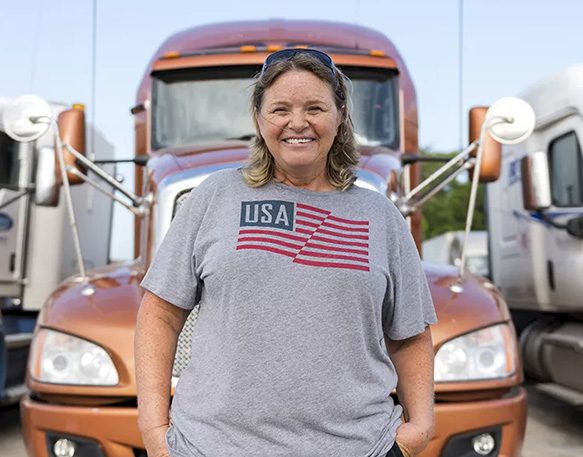Once you’ve decided on a cargo van, how do you find the freight that will keep you on the road? Using the spot market is one approach, but, in many cases, finding cargo van contracts is a better one.
In this guide, we’ll tell you everything you’ve ever wanted to know about cargo van contracts including how they differ from the freight you find on the spot market, what to look for in a contract, and how to go about getting one. But before diving into the specifics, it’s helpful to first review what exactly a cargo van is and what makes it a popular choice within the freight industry.
What is a cargo van?
Whether you know it or not, you’ve likely seen cargo vans in your day to day life. As the van of choice for Amazon deliveries, they’ve become fairly ubiquitous. As anyone who has seen one can attest, cargo vans have smaller load capacities than most other freight vehicles. Their capacities are more on par with pickup trucks rather than the much larger box trucks or dry vans often associated with freight, but that doesn’t mean a carrier with a cargo van can’t be just as successful as a carrier with a huge truck. That’s because each vehicle serves a specific and important purpose within the larger freight industry.
Shippers enlist cargo van owner-operators to haul loads that don’t require the square footage of a larger semi-truck. From a utility standpoint, cargo van carriers fill a variety of niche freight needs. They are perfectly suited for expedited deliveries, as well as hot-shot, ram, and other time-sensitive loads. Whether it’s e-commerce giants like Amazon or your local florist, companies of all shapes and sizes rely on cargo vans to move goods safely and on schedule. But the question remains, how do you connect with those shippers to get their freight in your cargo van?
The difference between contracts and the spot market
Freight transactions can be classified in one of two ways in the trucking industry: contract or spot. While both have their uses, a vast majority of freight transactions — anywhere between 80 to 90 percent on average — are of the contract variety.
There’s a good reason for that. More often than not, contracts are a win-win situation for shippers and carriers alike. Shippers benefit from the ability to secure capacity, as well as the more predictable pricing that comes with contract transactions. This is particularly valuable in high-volume lanes where the greater cost certainty of contracts makes it easier for shippers to budget proactively. Carriers, likewise, are all too happy to take advantage of the ample opportunities contracts represent in terms of longer-term partnerships that help them grow their networks and better ensure freight availability.
But what exactly are freight transaction contracts?
These are dedicated contracts with fixed rates that are negotiated ahead of time. However, unlike traditional business contracts, which are typically binding when it comes to both price and volume, most freight contracts, including cargo van contracts, are only binding in terms of price. Since transportation remains a dynamic industry, carriers can only guarantee capacity during certain periods of time, while shippers can, at best, only offer estimates of load schedules and lane volumes a few months in advance.
Despite the flexibility, that guarantee is still more than what one could get using the spot market alone. The spot market is dynamic by nature, meaning there is no guarantee whatsoever of pricing or volume. Instead of determining rates long before the freight reaches the truck, spot market rates are often negotiated within just a few days — or even a few hours — of a shipment. Because they are largely determined by the load-to-truck ratio in a given lane, these rates can vary significantly.
Another notable difference between the two relates to fuel charges. Cargo van contracts typically contain a fuel surcharge, which helps shippers offset higher fuel costs for carriers through the duration of the contract. Spot transaction rates, on the other hand, bake in all fuel charges upfront.
It’s worth noting that carriers can use both contracts and the spot market to find freight, choosing one over the other based on their specific circumstances of the moment. For example, the spot market can be a great place to find additional freight if something falls through. In fact, spot market transactions present a growing opportunity for cargo van carriers — comprising a bigger piece of the freight pie given the pandemic and supply chain bottlenecks. Data from DAT Freight & Analytics reveals that spot moves reached as high as 25% of total truckload freight at times in 2021 — nearly double the pre-pandemic levels, where market conditions saw spot moves peak at 13% of total freight volume.
However, it may not be best to rely on the spot market alone. Instead, dedicated cargo van contracts are generally a good place to start for any owner-operator seeking stable, long-term growth and a consistent freight rate. No matter whether you’re looking to use cargo van contracts or the spot market for your business, the best way to find quality freight is through a load board.
What to consider when looking at cargo van contracts
Cargo van delivery contracts are a great option for many shippers. But how do you find those contracts? Here are some tips for finding the best cargo van delivery contracts. When analyzing potential contracts, owner-operators should consider:
- Costs: Every load you deliver is going to cost you. Of course, the rate you get paid for that delivery should cover those costs, but the amount of profit you make depends entirely on the difference between your costs and your payment. Before you take on any new cargo van delivery contracts, it’s important to account for the costs you’ll face when making deliveries. These include everything from fuel prices to vehicle maintenance and repair costs. After you itemize these forecasted expenditures, sum up the total and arrive at an anticipated costs-per-mile metric to better determine how much you need to be paid for the contract to make financial sense.
- Payment: Before you sign up for any cargo van contract jobs, you want to have a firm understanding of how you’ll be paid. Beyond settling on a fair rate, you should determine the speed of payment and method by which you’ll be paid (cash, check, electronic transfer, etc.) ahead of time. If there are any bonuses mentioned in the contract, make sure to read the fine print since they can vary significantly between cargo van delivery contracts.
- Location: Not every contract is going to be located in a place that makes sense for your business. A cargo van delivery contract might offer you a lot of money at face value, but if it involves you stretching outside of your usual geographic radius, going to a more remote destination, or staying on the road longer than you’d like, it may be a poor fit for your needs.
- Predictability: Predictability and recurring work are the cherries on top of the best cargo van contract jobs. Whether you’re working through a deal with a shipper or a broker, it’s important to inquire early on about the nature of the work and just how consistent it is so you can plan ahead. Owner-operators with a fleet of cargo vans and other specialty trucks might be able to regularly meet one shipper’s unique freight needs, meaning they can expect to have frequent work from that shipper, while they might have other contracts with shippers who only occasionally require those same services. Knowing what to expect ahead of time helps carriers plan ahead.
Once you’ve considered all of these factors for a cargo van contract, you can make a decision about whether or not you want to take it.
How to get cargo van contracts
While there’s no hard and fast rule for how you have to get freight contracts of any kind, including cargo van contracts, there are a few good approaches that tend to be effective. It’s worth noting that freight contracts go through a long procurement process, meaning you are unlikely to experience instant gratification. Shippers often conduct freight bids or request for proposals (RFPs) annually — usually a year or two before the ship date, meaning that even if you get a contract, it will likely be some time before you start fulfilling it.
Before you can get to that stage, though, you first need to make some connections. Here are four ways you start to win great cargo van contracts:
- Liaise with freight brokers: Building relationships with freight brokers is a great way to build out your freight network. Reach out to brokers after you work with them and see if they might have more freight they can send your way. Create connections that mean you will be top of mind for that broker when a contract opportunity arises. Remember: the more developed your network, the more likely you are to earn contract referrals and win lucrative cargo van contracts.
- Hire a dispatcher: Dispatchers are another valuable resource that carriers can use to find new cargo van delivery jobs. Dispatchers are uniquely positioned to point you in the direction of brokers or shippers who might need your services. Dispatchers often manage the schedules of key industry players, and, if you have a relationship with them already, they will reach out if a request comes in for a truck that fits your wheelhouse.
- Prospect locally: Another good strategy for carriers just breaking into the business is to directly contact local shippers, brokers, or freight companies. Phone calls and mailing flyers are both great ways of doing that. Whether you’re able to immediately score a cargo van contract or not, discovering the local demand for your services is a great way to get your foot in the door for potential future cargo van contract jobs. Similarly, joining trucking associations and becoming a member of industry groups both locally and nationally can help you build your profile and visibility to shippers and brokers alike.
- Use load boards: Of course, these previous suggestions are often much easier said than done. A cargo van load board is the best way to explore all of the aforementioned growth strategies, creating and developing connections that will help you win new business. High-quality load boards let you gain access to industry leaders and even just local connections that can help you build your business. The best load boards empower you to earn high-quality cargo van contracts at the most competitive rates. No matter your level of experience and expertise, a cargo van load board is the best way to find freight.
Start finding cargo van contracts today
Any owner-operator or carrier who harbors dreams of building their cargo van fleet into a powerhouse with high-quality contracts that keep you on the road needs to invest in a top-quality cargo van load board. If you’re looking for the best, look no further than the DAT load board, the best and largest load board in the country with hundreds of thousands of new freight listings posted each day. All it takes is a few clicks to start finding top-quality cargo van freight and start building the relationships that will help your business flourish. At DAT, we know that who you choose to do business with matters. That’s why we only partner with the most capable professionals across the industry.
Download our free mobile app to learn more about how DAT can help move your business forward, or test out DAT’s cargo van load board and start exploring the many other tools DAT offers!
Find quality cargo van loads today!
Finding cargo van loads hasn’t always been easy, but the DAT load board makes it simple! With the DAT load board on your side, you can quickly find the freight you want from trustworthy brokers or shippers.
Ready to simplify your life? Start using the DAT load board today!




